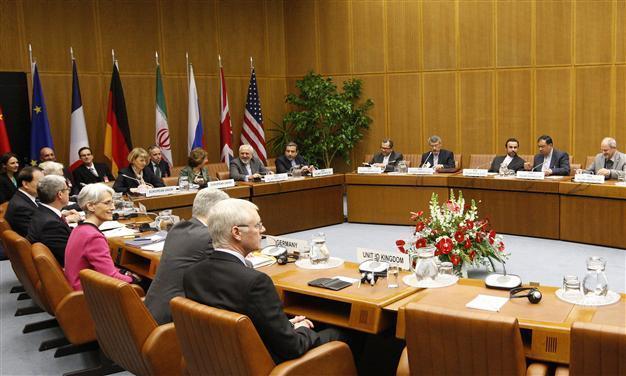Next Iran nuclear talks March 17: Ashton
TEHRAN - Agence France-Presse

A general view shows representatives of Iran, the United States, China, Russia, Britain, France , Germany and the European Commission as they attend the EU 5+1 Talks with Iran at the UN headquaters in Vienna, Austria on February 18, 2014. AFP Photo
Iran and world powers have agreed a timetable and framework agreement
for working out a lasting nuclear accord, and will meet again on March
17, EU foreign policy chief Catherine Ashton said Thursday.
"We had three very productive days during which we have identified all the issues we need to address to reach a comprehensive and final agreement," Ashton said after talks in the Austrian capital.
"There is a lot to do, it won't be easy but we have made a good start," Ashton told reporters.
"We have set a timetable of meetings, initially over the next four months with a framework to continue our deliberations," she said.
"Technical experts will meet in early March and we will reconvene for the next E3+3 political directors' meeting led by ... (Iranian Foreign Minister Mohammad Javad) Zarif and myself on the 17th of March" in Vienna.
Negotiators hope to build on an interim agreement reached in November under which Iran agreed to freeze or curb some of its nuclear activities for six months.
In exchange, Western governments offered minor relief from a range of punishing sanctions that have cost Iran billions of dollars in lost oil revenues, as well as a promise of no new sanctions.
The six-month deal expires on July 20 but can be extended, with the parties aiming to conclude negotiations and implement the final "comprehensive" deal by November.
The aim of the final deal would be for Iran to retain its civilian nuclear programme, but likely on a reduced scale and with enhanced oversight to ensure a dash for nuclear weapons is all but impossible.
Western nations and Israel have long suspected Iran of covertly pursuing a nuclear weapons capability alongside its civilian programme, charges denied by Tehran.
IRNA quoted an unnamed source as saying the Vienna talks did not include Iran's missile programme.
Iran laid out "red lines" related to its ballistic missile programme, nuclear sites and uranium enrichment ahead of fresh nuclear talks with world powers.
The US lead negotiator in the talks, Wendy Sherman, last week told a Senate hearing that Iran's ballistic missile programme would be addressed in the comprehensive deal.
